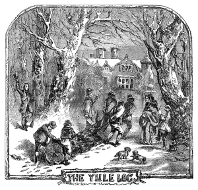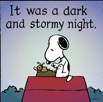The Spirit of Yule

Rosemary clipped the last candle to the highest bough of the Christmas tree, then stepped down from the footstool and stood back to critique her design. The candles were evenly spaced from top to bottom, side to side. Beneath them hung glass ornaments in various shapes and sizes, sparkling in the lamplight, most saved from her childhood. The garland of red glass beads that had been in her family for years swept from branch to branch, the perfect garnish for the whole effect.
She folded her arms, and nodded once at the finished product. Aloud, although she was entirely alone in her big house overlooking the sea, she said, “I don’t know why I bother,” and turned away.
She had never expected to be a woman completely alone at Christmas, but then, she supposed few people planned such a thing. A person doesn’t plan to lose both parents and a child and two servants to scarlet fever in the space of a month. A person doesn’t expect to wake up one day and realize her husband is also gone, driven away not by illness but by grief. A person doesn’t anticipate that the beautiful family home where she had expected to raise her children would be echoing and empty when she was only thirty years old.
Christmas the year before had been as different from this one as it was possible to be. Her mother and father were a bit frail, but in high spirits. Her husband had been promoted at the bank, and was uncharacteristically cheerful. She had spent days making cookies, soaking her homemade fruitcake in brandy, putting out fresh candles and refilling all the oil lamps.
And her little towheaded son, funny and happy and clever at six, had been whispering secrets to his grandmother and grandfather for days, then spending hours rustling paper and ribbon and tape in his room. He had brought down his treasures on Christmas Eve, just one year before this very day, a mismatched and awkwardly wrapped trove of little packages. He had stowed them proudly under the tree alongside the elegant gifts already tucked there, and had spent an hour arranging and re-arranging the colorful display.
Rosemary went to the great bow window that looked down on the restless waves below the cliff. With her arms still folded tight, she knelt in the window seat to watch the last of the daylight glimmer on the moving water. She had not dressed for the evening, because it was too much trouble. She was still in the shirtwaist and skirt she had worn all day, and they were none too clean. She had not made dinner, although the grocer had delivered a roasted chicken with peas and potatoes that afternoon. She had done no decorating except for the tree, and she doubted she would even light the candles. There were no gifts beneath it, which made it look bleak.
A great-aunt had sent her a card. It sat on the mantelpiece, unopened. The vicar’s wife had come with a basket of sugared plums and a rum cake. The basket lay on the kitchen table, its covering still intact.
“Do I feel sorry for myself?” Rosemary asked her reflection. She didn’t weep. She had not been able to weep, and often her eyes ached with the tears that would not come. She pressed her palms to her cheeks and scowled at herself. “Yes. Indeed I do. I think I’m entitled to that.”
Her reflection made no comment.
#
Benedetta crouched on her hearthstone to set the burning spill to the Yule log waiting in the fireplace. She was late. The solstice had come and gone, but she had been foraging along the cliff top every day, and forgotten the date. Her coven had all departed in recent years, passing through the veil to await their reunion on the other side, so there was no one left keep track of the calendar. Her chickens were no help. One day was just like another to them.
She had smudged her cottage, though, with a bundle of sage saved from the summer. She had made the spiced cider her coven had always drunk in celebration, and she had harvested a large stem of mistletoe to hang above her door. Her witch’s ladder dangled from a peg, where she could easily put her hand on it. She had made it herself, its knots of yarn carefully spaced, its totems woven into the braided strings. There was a silvery gull’s feather, a gray hag stone she had found on the beach, and a slender chunk of obsidian, worn smooth and shiny by the elements. She often ran the witch’s ladder through her fingers, pausing at each knot, contemplating the totems, a ritual that gave her comfort.
She sat back on her haunches, careful of her stiff knees, and watched the flame begin to dance. The log was nice and dry, one she had been saving for a long time, and the eagerness of the wood to burn gave her a little swell of satisfaction. She had made sure the wood was ready to crack before decorating with bits of pine and fir and spruce and threading it with pitch. When the evergreen needles caught fire, the scented smoke drifted neatly up the chimney she had cleaned just the week before.
She recited aloud, because it always seemed that the goddess heard her better if she used her voice:
“As the earth grows colder,
And the snow piles higher,
As the wind blows harder
And the restful darkness gathers,
Guide the light of the sun
To find its way home.”
She heard the voices on the wind singing through her rafters, the chants of her coven in their querulous voices. She closed her eyes to feel their awareness of her, and heard one whisper, “Soon, Benedetta. Soon.”
At that she opened her eyes. “Well, thank you very much, sister,” she snapped. “But not all that soon, I hope.”
Someone laughed, and the voices retreated so that she heard only the creaking of the roof beams and the chuckle of her hens in their coop. Benedetta levered herself to her feet. The Yule log crackled, sparkling in the dimness. She went to light a lamp, then on to her tiny kitchen to ladle a cup of cider.
She carried her cup back into the front room, and stood beside her window, looking out into the early dark. Above her cottage, set back a little from the road that ran along the cliff, she saw a glimmer of light from the big house. “Poor Mrs. St. John,” she murmured. She often talked to herself, had done it even when her coven sisters were still with her. “Poor, sad lady,” she repeated. “I’m used to loneliness, but for her it is painfully new. Such a terrible shock.”
It seemed to her the light was so small it could only come from a single lamp. One lamp, in that huge house! How dismal. She didn’t imagine Mrs. St. John, from her fine family, would care to drink homemade cider and watch the homely Yule log burn, but it was pitiful that there was no carriage trundling up the road bringing company to ease the grief of Rosemary St. John’s first solitary Christmas. To bring her a gift, perhaps, as was the custom of such people.
Benedetta sighed over the sadness of it. She was about to turn back to her hearth, to watch the dancing yellow flames inviting the sun to return, but something caught her eye.
It was just a flash at first, a flitter more pale than the darkness. It was low to the ground, perhaps the height of her waist. Which was, of course, lower than it once had been. Benedetta blinked, and leaned closer to the window. It came again, glowing white through the night.
She couldn’t think what that was. Her coven sister Sweetbriar always swore there were fairies along this coast. Benedetta had never seen one, but maybe that was because Sweetbriar left gifts for them, pinches of salt, heels of bread, once in a while a hen’s egg. Benedetta had done nothing like that. Maybe this was one of the fair folk come to demand its due.
But then she saw the face. The bit of color was a mop of hair so fair it was nearly white, and beneath it, the round, freckled cheeks of a child.
Benedetta gasped, and hurried to open her door. She leaned out into the chilly night, and called, “Hello? Hello? Are you there?”
There was no reply. Slowly, Benedetta pulled back inside, and closed the door to keep in the warmth. She drew a chair near the fireplace and settled in it with her cup of cider, but she frowned and worried, and couldn’t enjoy the moment.
#
Rosemary poured herself a glass of wine and knelt again in the window seat to look out into the blustery night. Across the road from her house, the sea heaved and swelled below the cliff, clawing at the beach and drowning the boulders. Another big house stood at the high point of the road, but it was dark, its inhabitants gone to town for the holidays. Rosemary looked the other direction, a little way down the hill. A spark of light showed from the witch’s cottage, which hunched beside the road, its roof uneven, its chicken coop as big as the house itself. The light emanating from it was bright, probably a fire in the fireplace.
Rosemary had never met the woman who lived there. Everyone in the neighborhood called her the witch, but Rosemary thought that was just because she didn’t go to church. The poor thing was probably just an old woman living with her chickens and selling eggs to get by. Rosemary’s cook had often bought eggs from her, and they were wonderful, with dark yellow yolks and perfect whites.
There was something about that brave firelight dancing through the dark that made Rosemary’s heart ache. The old lady must be very brave. There had been other women there, also elderly, but they had all gone, and the woman was on her own. Was she lonely? Did she feel as Rosemary did, that there was nothing left in the world to live for?
She thrust that thought away. It was sinful even to consider it.
It was true, though, that a person could die of sorrow. Of a broken heart, as they often said. Her own heart was certainly broken. Shattered into a thousand pieces.
She turned from the window and gazed at her unlighted tree, with no pile of gifts beneath it, no little fair-headed boy arranging and re-arranging them. The icy cold of the night seemed to pierce the thick walls of the house and grip in unrelenting hands. It made her want to cry out that she was already in enough pain to last a lifetime.
Still dry-eyed she repeated, bitterly, “I don’t know why I bother.”
#
Benedetta couldn’t drink her cider. She gazed at her beautifully burning Yule log, but she kept seeing that little face, the shock of fair hair. Had she imagined it? Sweetbriar had gotten very strange in the last years of her life, always claiming she saw things no one else could. Benedetta didn’t want to be like Sweetbriar. The coven sisters had taken care of Sweetbriar, but there was no one left to watch over Benedetta if she grew strange.
At last she rose, and went to take her heaviest cloak from its peg. She wrapped herself in it, and pulled her scarf low over her forehead. She glanced back to be certain her fire was safely contained, then opened the door and went out into the night.
“Hello?” she called. “Is there someone there? Are you lost?” The hens fell silent as she stood on the top step of her tiny porch, listening, peering out into the gloom.
When something tugged at her cloak, she jumped, and nearly fell off the step. She seized the porch railing to steady herself. When two small, cold hands seized her arm, she squealed with surprise.
In an instant she collected herself, and looked down to see what had touched her. She saw a pair of wide blue eyes in a freckled face. She didn’t think it looked like a fairy, not that she had any experience with the fae. It looked like a little boy. A solemn-faced, worried little boy.
She squeaked, “Are you—are you real, boy?”
He nodded several times. His mouth worked, but no sound came out.
“Won’t you come inside, out of the cold?”
He shook his head side to side, emphatically. The two little hands, so cold against her flesh, pulled at her arm, and he pointed to the road.
Benedetta said, “Walking? It’s too cold to go walking. Please—come in, and we’ll—we’ll try to understand each other.”
For answer, the boy pointed to her cloak. She picked it up, and slowly wrapped it around herself again. Still, she was reluctant. Why would she walk on the road with a little boy who couldn’t speak, whom she had never seen before, who might not be a human being at all?
He pointed with one hand at the road, and tugged at her arm with the other. Still Benedetta hesitated.
Then she heard the voices of her coven again. One voice in particular. She recognized it, although it had been several years. “Benedetta! Now!” It was Sweetbriar. Of course it was Sweetbriar.
“I don’t want—I’m not ready—” Benedetta faltered.
“Not that, silly! Not yet. Go with him now!”
“Sweetbriar—”
“Are you a witch, or are you not?” Sweetbriar’s last words were so soft Benedetta wasn’t sure she heard them. It didn’t help that the little boy was pulling so hard on her arm now she thought she might topple over after all.
She told him, “I have to put the fire screen up. My Yule log is burning.” The look on his face didn’t change, and she suspected he didn’t know what a Yule log was. She said, “Just come in for a moment, and then I’ll go with you. I have to put up the screen so my house doesn’t burn down.”
He let go of her cloak, and stood with his little hands hanging empty beside him. She opened her door, and beckoned to him to come in, but he didn’t move.
Sweetbriar’s words echoed in Benedetta’s mind. “Are you a witch, or are you not?”
Benedetta was a witch. She had been since her girlhood. She had been known for her potions, which were really just smart concoctions of helpful herbs, flower essences, aromatic oils. She had learned from her mother, who learned from her mother, and so on back through the generations. She could have called herself an herbalist, or a healer, but she quite liked being known as a witch.
So, now, she set up her fire screen, took her witch’s ladder off its peg, and went outside. The sound of the sea rose as she closed her door, but subsided as she called, “Boy! Little boy! Are you there? I’m coming. Wait for me!”
She held the witch’s ladder in her hand, her fingers slipping over the knots, one by one, as she walked cautiously down her short path. She wasn’t as steady on her feet as she had once been, and she didn’t dare move too quickly in the darkness, lest she fall. She touched the feather on the witch’s ladder, pleading, “Make him wait.” When her fingers reached the hag stone, she said, “Show me where he is.” And when she reached the bit of obsidian, she commanded, “Now, please!” and there he was, standing in the shadows along the road.
The ocean bellowed its relief as she tucked her witch’s ladder into a pocket and walked toward him. She reached for his little hand, and it was like taking a handful of snow.
#
Rosemary sat on in the dark night, her glass of wine barely tasted, her dinner sitting ignored in the larder. It was at this time on a Christmas Eve that she would light the candles on the tree’s branches. The family would sit together, admiring the scene, and then each would open a single present before extinguishing the candles and moving to the dining room for their roast beef and potatoes and steamed pudding.
After dinner, they would bundle up in scarves and muffs and mittens. They would climb into the carriage, and sing carols as it trundled down the road along the cliff. At the bottom it would turn into the village, where the venerable Norman church was alight with candles and lamps. Rosemary would dutifully kneel with her family to hear the story of the baby’s birth, the little savior come to atone for human sins.
What sin, she wondered now, had she committed? She had neither lied nor fornicated nor murdered nor dishonored her father and mother. She had cleaved to her husband, and obeyed him in all things. She had loved the Christmas story, the sweet mother, the loyal father, the precious infant cradled in a bed of straw.
What had she missed? Where had she erred, that she should be tormented in this way?
She could only come to one conclusion, and that was that there was no one who cared that she had tried to be a good woman. Not the baby Jesus. Not the angels who sang above Bethlehem. Indeed, no spirit at all.
Even those thoughts, bitter as they were, weren’t enough to make her tears come. It seemed her dry eyes would ache forever, reminding her every day of what she had lost.
She heard the sea suddenly roar beneath the cliff as if it was calling her. Perhaps the sea cared enough to take her pain away. In a daze, forgetting that this would be a sin, eager for relief from her pain, she went to her front door and fumbled it open.
#
Benedetta let the little boy lead her up the dark road. The ocean surged on their left, glowing faintly through the night. The darkness of the hills rose on their right, blotting out the stars. Ahead of them the only light was that single lamp in the big house. It was hard to walk without being able to see the ruts and stones, and Benedetta worried she would trip, but the boy tugged at her, pulling her faster and faster.
“Why are we hurrying?” Benedetta gasped. There was no reply. Benedetta could hardly catch her breath, and her feet felt clumsy, stumbling over unseen obstacles. She wished she had kept her witch’s ladder in her fingers, but to pull it out would mean letting go of the little boy’s hand, and she knew she couldn’t do that. She would lose him in the darkness.
She spared a second’s glance down at his fair head, his grave face. He pulled and pulled, leaning forward with the effort, like a horse pulling a too-heavy cart. Benedetta did her best to respond, panting, the cold air aching in her lungs, her feet stinging from the stones that littered the road.
When she saw the woman coming down the walk from the big house, she barely had breath to cry out.
It was Mrs. St. John. Her poor bereaved neighbor, with her pretty pale hair and slender waist, and neither coat nor hat against the cold. Benedetta struggled to get enough air into her lungs to call to her, but it was a weak cry that didn’t pierce the roar of the sea. “Mrs. St. John! Mrs. St. John, wait!”
There was no doubt what the young woman intended. Obviously, she was not in her right mind. A gust of wind caught her hair, and it fluttered out behind her like a scarf caught in the breeze. Her shirtwaist looked thin, perhaps even ragged, and her skirt billowed around her ankles. Her shoes were only slippers, insubstantial bits of silk and leather. She looked neither left nor right, but walked steadily forward. When she reached the middle of the road, the cliff was no more than fifty feet from her.
Benedetta tried to get another breath, but the little boy was pulling so hard on her hand she finally tripped. “Mrs.—” she began, but broke off as she fell to her knees. The boy let go of her and dashed ahead. Pain shot through Benedetta’s left knee as she struggled to her feet, and began to limp after the boy. “Mrs. St. John!” she called, but the wind blew her quavering voice away, and she knew Rosemary St. John had not heard.
She was only a few yards away now, but Mrs. St. John was a young woman, and far faster on her feet than Benedetta. Benedetta felt a desperate sob rise from her throat, because she couldn’t reach her in time, and the little boy—
The little boy threw himself at Mrs. St. John, and she stopped walking. She didn’t look down, didn’t seem to be aware of him, but she stood absolutely still in the middle of the road. She might have been a wraith, so insubstantial did she appear, with her hair and her skirt blowing in the wind as she gazed longingly at the luminescent water surging below the cliff.
Benedetta reached her at last. The boy’s arms were around Mrs. St. John’s waist, his face buried against her skirt, but she didn’t lift her hands to caress him. She stood eerily still, staring at the ocean, as if she were the only person alive in the world.
“Mrs. St. John!” Benedetta gasped.
At last, the young woman seemed to hear. Slowly, as if her muscles hurt, she turned to Benedetta. “Who—”
Benedetta spoke in a breathless rush. “I’m your neighbor.”
“What?”
“From the cottage.” She pointed back the way she had come.
Mrs. St. John’s face was as vacant as if she had just woken from sleep. “Why are you here?”
“Because of the boy,” Benedetta said, beginning to recover her breath. “I followed the boy, because he wanted me to.”
“What boy?”
“Why—this one.” Benedetta indicated the child clinging to Mrs. St. John’s skirt.
Mrs. St. John followed her gesture with her eyes, then looked back at Benedetta. “I don’t see anything,” she whispered.
Shock swept over Benedetta, raising gooseflesh on her neck, making her hands shake, weakening her knees. When she spoke, it was also in a whisper, as if that could make what was happening less real. “You don’t see him?”
Mrs. St. John blinked, and repeated, in a voice even fainter than Benedetta’s, “I don’t see anything.”
A heartbeat later, neither did Benedetta.
The sudden and complete disappearance of the child made her catch her breath in wonder. Finally, she grasped what was happening and cursed herself for being slow. She took a long breath, and released it little by little, amazed and grateful and comforted. She was a witch. She was still a witch. Sweetbriar may have been strange, but she had been right.
Mrs. St. John began to shiver, and Benedetta said, “Come. Let me get you inside, where it’s warm.”
Mrs. St. John allowed herself to be led, trembling like a leaf in the wind, but she said, “It’s not warm.”
“Is it not? Well, then. You just let me build up the fire and wrap you in a blanket. We’ll get you warm quick as anything.”
“I was—I was going to—”
Benedetta opened the front door of the big house, and urged Mrs. St. John over the sill. It was true that the house wasn’t warm. They crossed a wide hall to a dim, chilly parlor. A forlorn Christmas tree stood in one corner, studded with unlit candles and glass ornaments. The big fireplace held nothing but a half-burned log, but there was a metal bin of kindling next to it, and a small pile of wood. Benedetta found a blanket thrown over one of the big divans, and coaxing Mrs. St. John to sit, she tucked the blanket firmly around her, and put a cushion under her feet.
In a short while, she had a fire burning energetically. She said, “Kitchen?” and Mrs. St. John nodded vaguely to a room across the hall. There Benedetta filled a kettle, brought it back to set on the hob to heat. She returned to the kitchen, where she discovered the untouched supper waiting in the larder. She left it there, but came back with a teapot, and set it on the hearth to warm while she waited for the kettle to boil. Over her shoulder she said, “I didn’t want to start your cooker. I’ve never seen one like that.”
Mrs. St. John didn’t answer.
By the time the tea was made, Mrs. St. John had stopped shivering. Benedetta put a cup in her hands, and poured one for herself. She sat down at the other end of the divan, not too close, but not too far, either. She said, “It’s not my place, but I want you to know how sorry I am for all that has happened to you.”
Mrs. St. John said, as if Benedetta had not spoken, “What little boy?”
“Ah.” Benedetta took a sip from her cup. It was very good tea, the best. She said, “Mrs. St. John, drink a bit of tea. It will calm you.”
Obediently, as if she were a child herself, Rosemary drank. Then she said again, “What little boy, Mrs. — Oh. I don’t know your name.”
“Just call me Benedetta. No one has used my surname in years.” Benedetta sipped again, then set her cup down on a side table.
“They say you’re a witch,” Mrs. St. John said, then put her hand over her mouth. “Oh. Oh, I’m sorry. I just—I was about to—”
“I know, Mrs. St. John. Don’t apologize.” Benedetta smiled a little, and pulled her witch’s ladder from her pocket. “Do you know what this is?”
Mrs. St. John shook her head.
“It’s called a witch’s ladder. It helps me accomplish things that are difficult.” Mrs. St. John’s eyes grew wide, and Benedetta thought if she grew any paler she would look just like the little boy. The little spirit boy.
She said, “Mrs. St. John, I did see a little boy. I think he might have been yours.”
Mrs. St. John’s hand suddenly shook so badly Benedetta leaned to take the teacup from her. “M-mine?” Mrs. St. John faltered. “How could it have been m-my little boy? He’s . . .” She covered her face with her hands.
“I know, dear. I know.” Benedetta slid her fingers down the knots in her witch’s ladder, feeling the feather, then the hag stone. “I think he brought me to you so you wouldn’t throw yourself into the sea. I think your little boy knew you would be sorry if you did.”
Mrs. St. John dropped her hands, and Benedetta saw that her eyes were perfectly dry. Had she cried herself out? Or had she been unable to cry at all?
“It can’t be,” Mrs. St. John said.
“And yet . . .” Benedetta’s fingers reached the bit of obsidian. She took care to speak softly, so as not to alarm the young woman, but clearly, so that Mrs. St. John would understand. “And yet, my dear, he is standing just there, at the foot of the stairs.”
Mrs. St. John sat up very straight, first staring at Benedetta, then following her pointing finger. She shook her head. “There’s nothing there.”
“There is, actually,” Benedetta said. “You can’t see him, but fortunately, I can see him for you. No doubt that is why he came for me.” She pushed herself up from the divan. “I’m going upstairs with him. Would you like to come?”
For a long moment, Mrs. St. John stared at what must be, to her, an empty stairwell. Her lips were apart, her eyes stretched so wide Benedetta thought they must hurt. But then, with a little anxious moan, Rosemary stood, and followed Benedetta to the stairs.
The boy had already started up, and Benedetta labored after him, clinging to the banister for support. He didn’t look back, but turned into one of the rooms on the second floor. Its door stood open. When Benedetta reached it, she glanced back. “Does this room mean something, Mrs. St. John?”
Mrs. St. John was just behind her. “This is my little boy’s room.”
“Ah. Well, the child has gone inside. May I go after him?”
Mrs. St. John’s arms were wrapped tightly around her middle. She nodded, and when Benedetta went into the room, she followed.
The bedroom was perfect for a child, with charming small animals on the wallpaper and shelves of picture books and toys. The bed was made up with bright pillows and a thick rug. It all looked as if the child who lived there had just gone out.
But he was there. He turned his solemn expression on Benedetta, and pointed a finger at the bed, then under it. Stiffly, she lowered herself to her knees, bracing herself on the bed post.
“What are you doing?” Mrs. St. John breathed.
“He wants me to look under the bed.”
“Oh! My son always hid things under his bed!”
Benedetta reached past the ruffled bedskirt, stretching out her arm as far as it would go, scrabbling with her fingers, but not finding anything. She pulled back, panting a little, and found the boy crouched next to her. He put his head under the bedskirt without lifting it, an action that was a bit unnerving to observe. When he re-emerged, he took her hand in his little cold one, and directed it. This time she felt a small package beneath her fingertips. She had to stretch her fingers as far as they would go, but she was able to grasp it.
She pulled it out, and set it on the bed before she began the process of getting back on her feet. When she was upright again, she looked at the package. It was a gift, awkwardly wrapped, with uneven corners and badly-tied ribbon, but still, clearly, a gift. A Christmas gift. An oversized label was attached, and the word “Mummy” written there in a childish hand.
Benedetta glanced at Mrs. St. John.
The young woman stood with her hands pressed to her cheeks. Tears streamed through her fingers and down her face, more tears than Benedetta had ever seen one person shed. It was as if a dam had broken, and all the tears that had held back burst forth in a torrent.
The spirit boy was gone, disappeared without a trace. But his gift for his mother, the one he had wrapped weeks before and hidden where he thought she wouldn’t find it, was there in his place.
#
Rosemary cried for an hour. She didn’t sob, but the pent-up tears poured down her cheeks as she huddled on the divan with her son’s little gift in her hand. She didn’t open it. She thought she might never open it. What was inside didn’t matter. What mattered was that he had made such an effort to guide her to it.
She had never seen him, but the old woman from the cottage obviously had. When Rosemary’s tears eased for a time, she asked her—Benedetta, that was her name—she asked Benedetta how her boy looked, if he seemed well, if she thought he was all right.
Benedetta, sitting close beside her, not touching her but clearly ready to do so if necessary, gave her a small, wrinkled smile. “Everyone is all right, my dear,” she said. “Every one of us is all right in the end. Your child is no different.”
Rosemary said, “I am not all right, Benedetta.”
“No. Not at the moment. I’m so sorry.”
Rosemary surprised herself by murmuring politely, “Thank you.” She couldn’t recall having said anything so normal, so quotidian, since the first of the deaths had struck her house. Thinking of that made the tears begin again.
The old woman sat patiently beside her as she wept for another hour. When that bout of tears slowed and stopped, Benedetta patted her arm. “I saw some dinner in your larder,” she said. “Let us take it to my cottage, if you don’t mind stepping just a bit down the road. We can watch my Yule log burn, have a sip of cider and a bite of supper. You look as if you haven’t eaten in some time.”
Rosemary surprised herself once again by acquiescing, and she soon found herself warmly dressed, with shoes and stockings on her feet and her fur coat around her, following a woman she had never met before down the dark road and into the tiny house. It was warm inside from the log that glowed gently in the hearth. Benedetta settled Rosemary on a chair near the fire, then stirred it up until the log blazed up as if with joy.
As Benedetta pressed a warm cup of cider in her hand, Rosemary asked, “Will I ever feel joy again?”
For answer, Benedetta placed the witch’s ladder in her lap. “Drink your cider,” she said, in her creaking voice. “Then work the witch’s ladder with your fingers. You will know that joy returns, in its time.”
Rosemary did just as she was bid, and she learned, though it made her weep again, that the witch was right.
THE END

The Spirit of Yule Read More »


 and interlibrary loans are our magic carpets.
and interlibrary loans are our magic carpets.
 you want to use. I’m especially fond of costume websites, which can give you that one, small detail to make your characters come alive.
you want to use. I’m especially fond of costume websites, which can give you that one, small detail to make your characters come alive.





